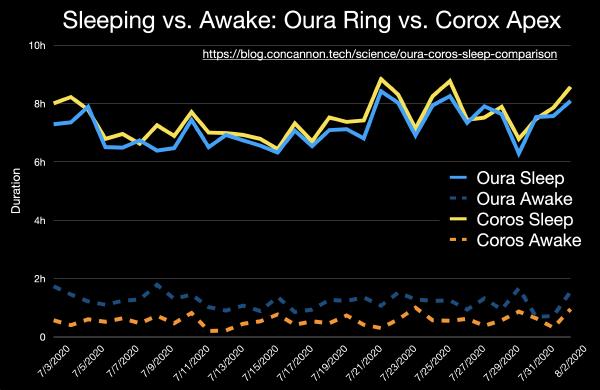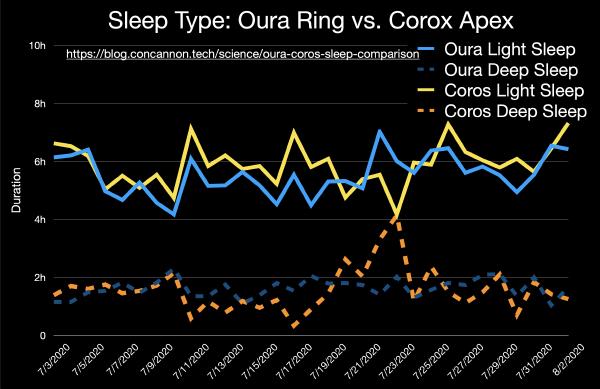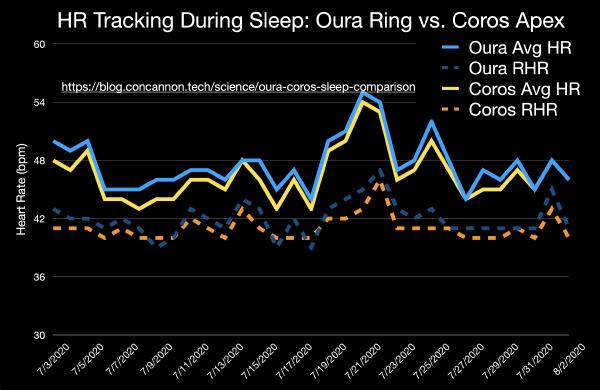Introduction
Sleep-tracking devices have gained lots of attention over the past few years, and rightfully so. In this post, I expose my own sleep data as collected over a 1-month period by two different sleep trackers - the Oura Ring and the Coros Apex GPS watch.
The Importance of Sleep
Matthew Walker’s Best-Selling book Why we Sleep seems to come up frequently. I heard the book mentioned in several conversations and podcasts over the past few years, and it piqued my interest in optimizing my own sleep. Bill Gates wrote about it.
For the athlete, sleep becomes even more important than it is for the general population. Matt Laye wrote about “Sleep and the Ultrarunner” for Ultrarunning Magazine. TrainingPeaks has a blog post about “How to ‘Bank’ Sleep Before Your Next Ultramarathon.
The hype around sleep was enough to make me dive into my own self-experiment. I started to track my sleep in order to quantify any improvements (or more importantly, any negative trends).
Sleep Trackers
Oura Ring
I heard great reviews about the Oura Ring, so I bought one. I think it’s great. A side note here for the COVID-19 era - Oura teamed up with UCSF to launch the “TemPredict” Study in order to give front-line healthcare workers Oura rings so that they can try to predict COVID-19 cases by looking at changes in body temperature, respiratory rate, and heart rate. They have two study arms - one for healthcare workers, and one for the general population. I’m participating in the general population study. Way to go, Oura and UCSF!
Coros Apex
I have owned a Coros Apex GPS watch for over a year, but I was curious how it would stack up against a sleep-specific tracker. The Apex does a whole lot more than sleep tracking.
Data Comparison
Summary
My month of data collection included a period of very low athletic training, a period of ramping up training volume, a vacation at high altitude, and a couple nights of backpacking. Needless to say, there was a lot of variety that would cause fluctuations in my sleep patterns. I was impressed with the sleep tracking capabilities of both devices.
Total Sleep Duration

Total Sleep vs. Awake Durations by Oura Ring and Coros Apex
I was impressed that the Coros differed from the Oura ring by just +18 minutes on average when measuring total sleep. The trends tracked very well - the difference was relatively consistent no matter the absolute amount of sleep achieved on a particular night.
The awake time, by contrast, was different by a wide margin. The Oura ring recorded an average of 1 hr 12 mins of awake time, which is +39 minutes per night compared to the Coros. Anecdotally, I tend to take 20 mins to fall asleep, then I wake up a few times during the night. The truth probably exists somewhere between these two tracker numbers.
Sleep Classification

Light vs Deep Sleep Durations by Oura Ring and Coros Apex
I calculated the “Oura Light Sleep” by adding together the “REM” sleep and the unclassified sleep. Since Coros does not label REM sleep, I created the aggregate “Oura Light Sleep” data point to do this comparison of sleep type.
As you can see from the graph above, the numbers are somewhat similar but the lines cross and diverge a few times. They track relatively well with each other, but not as well as the total sleep numbers.
Heart Rate During Sleep

Resting and Average Heart Rates During Sleep
The heart rate data tracked very closely for both devices. The Oura ring uses 3 optical sensors on your finger, while the Coros uses a single optical sensor on the wrist. I find that the Coros optical sensor data is usually wrong when I am running (I use a chest strap for that comparison), but it seems to be accurate at rest.
Impressions
I was very impressed with both devices for their alignment in much of the data collected. Given that the Oura ring is expensive and was created for this exact purpose, I expected a high level of performance. The Coros’s accuracy alongside the Oura Ring was a surprise.
I am happy to see that my sleep trends tracked very similarly across multiple devices, because this gives me confidence that I can trust the numbers now and going forward.
Future Experiments
I plan to use the Oura Ring as a recovery indicator as I continue to ramp up my running to high-volume, 10+ hr training weeks. In addition to the sleep data shown here, the Oura Ring will also track body temperature, heart rate variability and respiratory rate. These metrics together are combined to report a “readiness score” that tells whether or not a person is prepared for a hard training day or a race. More importantly, these metrics give feedback on when an extra rest day is needed.